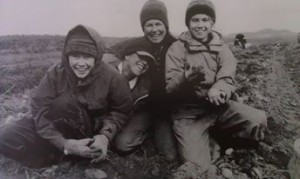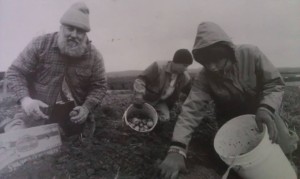
In other years, Thanksgiving has found me ranting about Black Friday’s commercialization of greed during a holiday of gratitude. I have written historical exposes of the historical Thanksgiving and the genocide of the native tribes. I have explored the inner convolutions of emotions that come along with being an American. This year, I chose to leave those angles in the skillful hands of other writers, and offer my family story.
My sisters, Marada and Leah Cook run Crown of Maine Organic Cooperative, a twenty-year old family business that distributes Maine-made product and produce throughout the state. Thanksgiving, to them, is a celebration of the diversity and bounty of Maine’s local small growers and producers. The feast laid out on the table could serve as a roadmap of the state: potatoes from up north in The County (as Aroostook County, the largest and least populated area in the state is called), turkey from Flying Pond Farm down south, seaweed sprinkled on the rolls (hardly a traditional dish, but if your sister-in-law is a sea vegetable advisor for the Maine Cooperative Extension, you roll with it), and often the canned, stored, or frozen vegetable harvested from the summer garden right at home. And, lest we paint an overly idyllic picture, it should be noted that the homemade apple cider pressed from the orchard’s fruit will sit side-by-side with Moxie, an iconic Maine soft drink currently owned by Coca-Cola. Politics is separable from food and, inevitably, every angle of food politics from the Poland Springs water contract to tar sands pipelines, labor movements both current and historical, potato blights, fuel prices, Farm Bills, tourist dollars, dwindling fisheries, and booming eels exports to China, ends up on the table along with the mouth-watering dishes.

Back when I was a teenager, working on our family farm, the State of Maine came out with the slogan, Get Real, Get Maine. At the time, we laughed at the bureaucratic advertising scheme and swatted the hordes of mosquitos away as we hefted 60lb boxes of potatoes. We dismissed the slogan as a tourist trap that would seduce people from ‘Away’ (as we called any place outside of the state) to picturesque seaside coves that lay three hundred miles to the south of us. The real Maine we lived in – shoveling chicken manure, chasing seven-hundred pound pigs that broke loose, swatting the black flies with one hand while squishing the potato beetles with another – was hardly advertisement material.
Or so we thought.
By the time I left for college, my siblings and I had become, quite literally, poster children for a growing Maine food revival. Our family story is part of a collection of stories about small farmers and local producers who did get real . . . we got real about the problems of industrial agriculture, climate change, the domination of the economy by mega-corporations, destructive forms of capitalism, the fragile long-distance transportation system, and, most importantly, our values. Mainers got real and got Maine engaged in the long haul of rebuilding the local food economy. Mainers have always prized self-sufficiency and independence. Those qualities, in combination with a firm belief in supporting your neighbors, grew a network of growers, producers, restaurants, grocery stores, and buying clubs to support local agriculture. It is also worth noting that the local food movement involves people from all ends of the class spectrum. In Maine, local food isn’t just for wealthy, natural food store shoppers; it is the heritage of an area long used to fending for itself. In many ways, local food is the cultivation of a relationship to people and place.

It is not easy to propose and actualize alternatives to the corporatized food system of the United States. The small organic farmer versus Big Agribusiness is a true David and Goliath story of our times. As I study nonviolent struggles around the world, similar instances of the Underdog versus the Empire provide useful perspectives on the challenges we face in our own communities.
In the struggle for Indian Independence, Gandhi formulated a strategy called “Constructive Programme” or “Swadeshi”, which built pride and economic independence from British imports through projects that provided for the basic needs of the people. In India, this involved eighteen distinct enterprises, the most well known of these are the weaving of cloth and the making of salt. Gandhi used Constructive Programme to both empower the Indian movement for self-rule and to undermine British control. In a five-year period, the British trade with India fell nearly fifty percent!
The local food movement in Maine is not a coordinated nonviolent struggle for revolution, but it is quietly and humbly accomplishing many of the same aims. A source of strength, independence, and pride can be found in everything from seaweed to sheep’s wool, little-known delights like maple cream and blueberry butter, and also in staples, such as potatoes, wheat flour, and, yes, salt!

It has never been an exaggeration to say that Maine has a distinct ‘flavor’ . . . but in recent years the phrase has shifted from metaphorical to literal. I have seen the local food movement contribute to a rising sense of pride in Mainers, in themselves, their region, and their accomplishment in the face of tremendous odds. In a time when corporate-control of politics is wreaking havoc on our environment, economy, and society, the progress of the Maine local food movement should be applauded.
Thanksgiving is always a time of deep reflection for me. As I give thanks for the bounty of this moment, I am also forced to confront the challenging questions posed by history and identity. My family’s story is entwined in this as deeply as the next, but I take stock in the idea that change is always enacted in the present. Hopefully, the story of local food and family is a part of writing a more humane chapter in the course of American history.
Tune into Occupy Radio for a Thanksgiving Special as co-hosts David Geitgey Sierralupe and Rivera Sun interview her sisters, Marada and Leah Cook on food politics and family history. Listen Live on Wed, Nov 27th (7pm PST/10pm EST) here and join the live chat on the Occupy The Media Facebook page during the show. Can’t make that time? The podcast comes out on Sat Nov 30th on occupythemedia.podomatic.com.
Read the Crown of Maine Blog for mouth-watering and mind-stimulating thoughts on local food in Maine and find out more about them at www.crownofmainecoop.com
Author/Actress Rivera Sun sings the anthem of our times and rallies us to meet adversity with gusto. In addition to her most recent novel, The Dandelion Insurrection, she is the author of nine plays, a book of poetry, and her debut novel, Steam Drills, Treadmills, and Shooting Stars, which celebrates everyday heroes who meet the challenges of climate change with compassion, spirit, and strength.